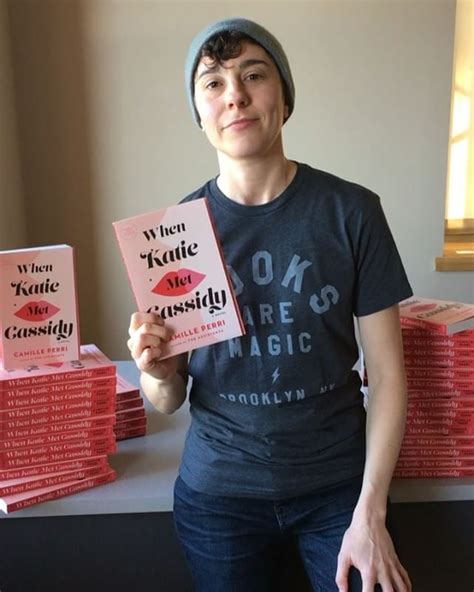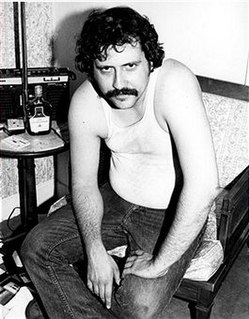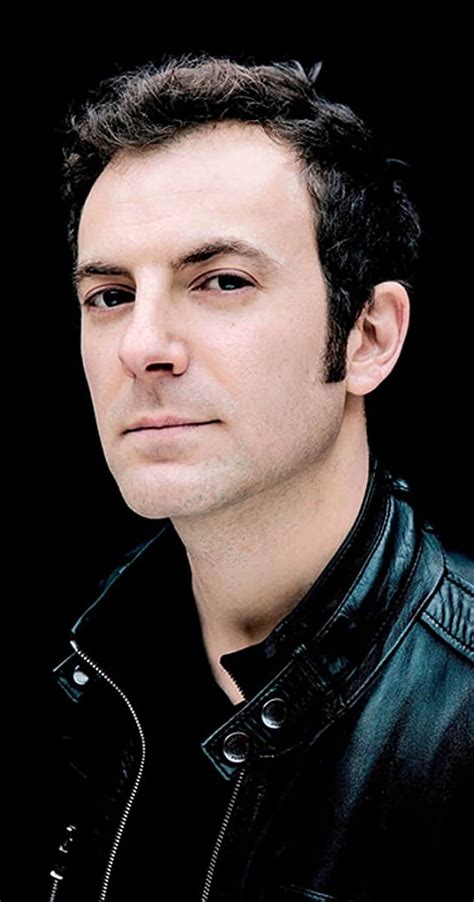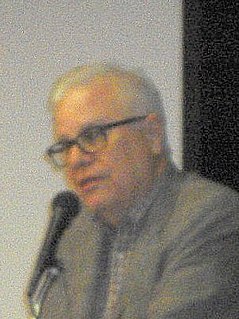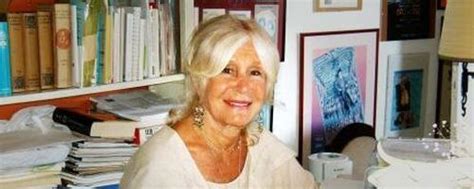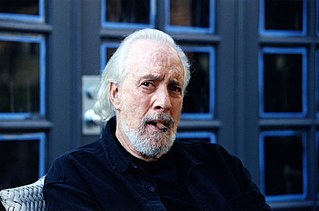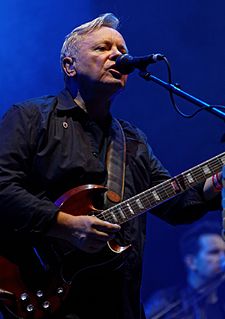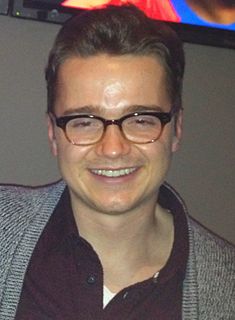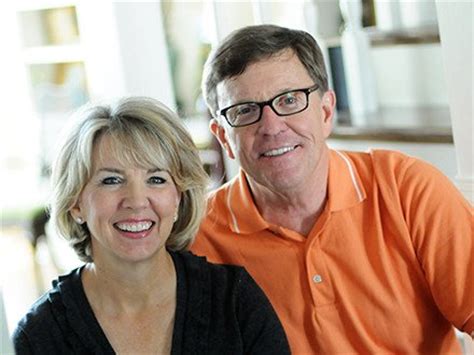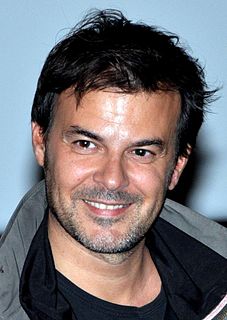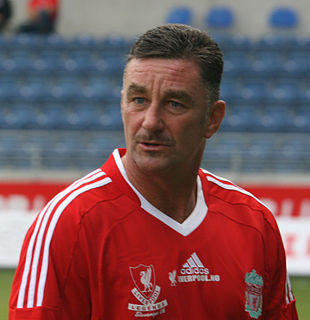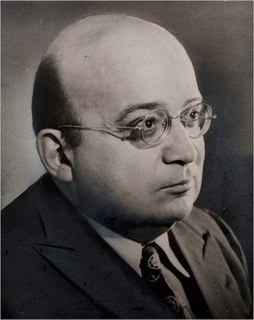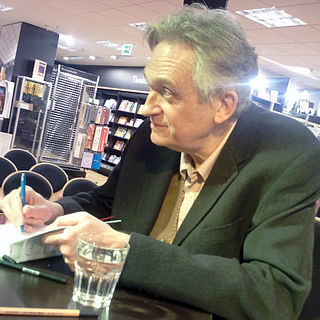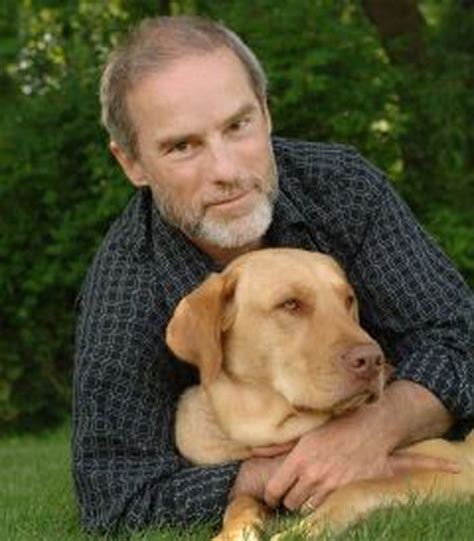Top 453 Adolescence Quotes & Sayings - Page 7
Explore popular Adolescence quotes.
Last updated on December 18, 2024.
I spent the first summer after my diagnosis creeping about in giant sun hats and tents, cursing the sun, staying inside as much as possible. Now I am beginning to think the most important thing is educated sun exposure, because the melanomas of today are not caused by today's sunbathing, but by our childhoods and early adolescence.
I certainly firsthand know and love people who didn't fall in love with a woman or didn't even realize they were attracted to women until much later in life, and I'm sure that's true for many men who find themselves attracted to men as well. It doesn't always happen in adolescence. And that experience is completely valid and OK.
Personally I feel that real rock 'n' roll may be on the way out, just like adolescence as a relatively innocent transitional period is on the way out. What we have instead is a small island of new free music surrounded by some good reworkings of past idioms and a vast sargasso sea of absolute garbage.
I've always tried to honour my dad and what he did for Yorkshire, which for him frequently meant putting the county's cause before his own. But my late boyhood, my early teens and my adolescence were full of net sessions and practice drills he never witnessed, ups and downs he never knew about and matches he never saw.
The first typical adolescent of modern times was Wagner's Siegfried. : the music of Siegfried expressed for the first time that combination of (provisional) purity, physical strength, naturism, spontaneity and joie de vivre which was to make the adolescent the hero of our twentieth century, the century of adolescence.
My own first love was biology. I spent a great part of my adolescence in the Natural History museum in London (and I still go to the Botanic Garden almost every day, and to the Zoo every Monday). The sense of diversity of the wonder of innumerable forms of life has always thrilled me beyond anything else.
With tremendous clarity and wisdom, Daniel Tomasulo has crafted a memoir at once heartbreaking and uplifting. Layers of time and memory—childhood, adolescence, early adulthood, middle age—are so beautifully revealed here, a trenchant reminder that our pasts are alive inside of us. There are psychologists who can write, and writers who can psychologize, but rarely have the two met on the page with such moving, profound results.
When you're sixteen and struggling to forge an identity out of a morass of hormones and daydreams, remarks like that cut a deep groove in the brain. I trace the ongoing, victorious-feeling semi-starvation of my twenties directly back to adolescence - as a way of showing those assholes that I could control my appetites... Which is so sad, in retrospect, because of course no one cared.
We carry adolescence around in our bodies all our lives. We get through the Car Crash Age alive and cruise through our early twenties as cool dudes, wily, dashing, winsome . . . shooting baskets, the breeze, the moon, and then we try to become caring men, good husbands, great fathers, good citizens.
I think that every child grows up with the ideas that what we our given, is our society. Your education, and your mother and father, they tell you this is how it is, but then you hit adolescence and you think, 'Is it? Why? Why is it like that?' Sometimes that questioning leads to something more. Sometimes it doesn't, and we just continue these cycles.
These principles with due regard to time and place, must, in accordance with Christian prudence, be applied to all schools, particularly in the most delicate and decisive period of formation, that, namely, of adolescence; and in gymnastic exercises and deportment special care must be had of Christian modesty in young women and girls which is so gravely impaired by any kind of exhibition in public.
In adolescence I started to find out about Robert Wilson because I saw Lou Reed's "Timerocker" at [the Brooklyn Academy of Music]. I started getting into Jim Jarmusch and knew that my uncle was a friend of his. I pieced together parts of his life in high school and college, which lead me to his story in a funny way.
No one can threaten poetry. It's always been there, always will be. Humans need it to live: it has sustaining powers. How could we (anyone) get through adolescence without some form of song? Song is only a version of lyric poetry that is carried more by melody than by internal coherence and unity. but lyric and song - they are the same.
From the writing stage, I had envisioned a film that would be bright and light, even if the movie addresses adolescent unrest and self-destructive behavior. Talking about adolescence, I wanted to make a very musical film that was also a love story with a sensorial, sensual dimension and which had a strong emotional impact.
Butterfield 8, with its call-girl heroine working her way down the alphabet of men from Amherst to Yale, appeared at a very formative moment in my adolescence and impressed me forever with the persona of the prostitute, whom I continue to revere. The prostitute is not, as feminists claim, the victim of men, but rather their conqueror, an outlaw, who controls the sexual channels between nature and culture.
The upheavals of adolescence silenced 'A Christmas Carol' for a few years. I became a firebrand atheist. Christmas - humbug! Too commercial! Then I became an agnostic. Christmas was a pro-forma affair, basically a chore. Buy mother a book, dad a new tie, my brother and sister small gifts. Pretend thanks for the fountain pens and shirts I received.
I remember I thought I should become a doctor, even though I had no talent for science whatsoever. Then of course, until I was about sixteen, I thought I might have a shot as a major league baseball player. But once I hit my full adolescence I lost all interest in that. I discovered, in rapid succession, books, girls, alcohol and tobacco, and I've never turned back. Those are the four things I'm most interested in.
I intentionally leave adults out in my stories, not to say that they're not in charge or that they don't care, or that they're failing at what they do. Not at all. It's two things: It's a way to be true to what adolescence feels like, because, okay, your parents may be around, but you still don't want them to be around. What you go through, you go through alone, I think.
Adolescence was invented in the 19th century to enable middle-class families to keep their children out of sweatshops. But it has degenerated into a process of enforced boredom and age segregation that has produced one of the most destructive social arrangements in human history: consigning 13-year-old males to learning from 15-year-old males.
One of the high points of my life was when I suddenly realized that this dream I had in my late adolescence of combining pure mathematics, very pure mathematics with very hard things which had been long a nuisance to scientists and to engineers, that this combination was possible and I put together this new geometry of nature, the fractal geometry of nature.
I love 'Sweet Valley,' but I love it from a different angle. There are people for whom it is their adolescence. They own it, in a way that even I don't. I've come to respect the project more because of the response than I've had. It's more important than I realized it was. I didn't understand the breadth and depth of it. now I'm beginning to more.
I was never a big fashion person, and so I'm sure I wore whatever. I was growing, and so I just wore whatever clothes that weren't that expensive and made sense at the time. But I'm sure that I look back and say, 'What was I thinking?' My adolescence was more in the '80s, and that's more my cross to bear.
I guess there was a little bit of a slight rebellion, maybe a little bit of a renegade desire that made me realize at some point in my adolescence that I really liked pictures that told stories of things - genre paintings, historical paintings - the sort of derivatives we get in contemporary society.
Instilling values of faith at an early age is important. Listening them through adolescence comes more important than teaching because if you haven't instilled in them at early ages now it's time to listen and get your report card and let them find their way and then as an adult let them stand aside.
We cannot know the young child's personality by studying his systems of interest, for his attention is as yet too labile, his reactions impulsive, and interests unformed. From adolescence onward, however, the surest clue to personality is the hierarchy of interests, including the loves and loyalties of adult life.
I think Los Angeles certainly grew out and grew up, but I don't think it matured. It lost the appeal and the hunger and the beauty of its adolescence and went straight to a middle-aged ugly, overfed monster seeking mindless pleasure and being obsessively acquisitive. It's so materialistic. It grew up, but it didn't mature.
I think when you're in your 20s, going from adolescence to about 24, I think your life is a series of emotional storms that you have to weather. Life is more emotional at that time, and you're less equipped to deal with what life throws at you. I always think that if you can get past 24, than life really starts at that point.
If you don't know about the 'black male code,' you should. It's something black boys learn early, even before adolescence. It goes, in part, like this: Even though you're not a criminal, some people assume you are, especially if you're wearing certain clothes. Never argue with the police, but protect your dignity and take pride in humility.
The only lie I really remember from my adolescence was when I was in sixth grade and I was dropped off with a couple of friends at the movie theater to go see a movie, I can't remember which one it was, and we went to go see this movie instead that was rated R. That was sort of a defining moment, that was probably the first time I had ever lied to my parents about something.
One of the tragedies of our day is that too many boys are growing up without guidance of a father, or another man, to show them what it looks like to do away with that boyhood stuff. As a result, they often move into adolescence and then adulthood looking like men but still speaking, reasoning, and behaving like boys.
When I remember how unhappy I was in adolescence - about the fact that, though I wasn't really using the term to or for myself, I knew that I was gay - I think, "Oh, if someone then could have shown me just an hour in the life that I have now, I would have made it through all of that misery and despair just fine." The pain lay in thinking that I had a desolate future.
Being someone who had had a very difficult childhood, a very difficult adolescence - it had to do with not quite poverty, but close. It had to do with being brought up in a family where no one spoke English, no one could read or write English. It had to do with death and disease and lots of other things. I was a little prone to depression.
The average age in the U.S. is now thirty-three, whereas Mexico gets younger and younger, retreats deeper and deeper into adolescence. Mexico is fifteen. Mexico is wearing a Hard Rock Cafe T-shirt and wandering around Tijuana looking for a job, for a date, for something to put on her face to take care of the acne.
The first idea of Young and Beautiful was to have a young boy and to explore the sexuality of boys. But, I realized, with a boy doing prostitution, of course it has to deal with homosexuality. And I had a feeling it was too much for the film, you know, sexuality, prostitution, adolescence ... there were too many films for one film.
As Elders, we are fully committed to the principle that all human beings are of equal worth. You will see that we highlight equality for girls and women - not just women's rights. That is important as girls, especially adolescent girls, have been almost invisible in debates on equal rights. Yet it is in adolescence that events can have a huge effect on a girl's life.
One of the traps of adolescence is the sort of paranoid resentment that somehow you're never going to match up and that everybody else's life is going to be better and finer and fuller. That everyone else attended some secret lesson in which how to live was taught and you had a dental appointment that day, or you were somehow not invited. And the point of great writers like Wilde is that they make that invitation to you.
Childhood in large parts of modern Britain, at any rate, has been replaced by premature adulthood, or rather adolescence. Children grow up very fast but not very far. That is why it is possible for 14 year olds now to establish friendships with 26 year olds - because they know by the age of 14 all they are ever going to know.
When she is older she will see in these resemblances a regrettable uniformity among individuals (they all stop at the same spots to kiss, have the same tastes in clothing, flatter a woman with the same metaphor) and a tedious monotony among events (they are all just an endless repetition of the same one); but in her adolescence she welcomes these coincidences as miraculous and she is avid to decipher their meanings.
Fitzgerald never got rid of anything; the ghosts of his adolescence, the failures of his youth, the doubts of his maturity plagued him to the end. He was supremely a part of the world he described, so much a part that he made himself its king and then, when he saw it begin to crumble, he crumbled with it and led it to death.
Our hypothetical rich client might even have ordered a Pommard, because it was listed at a higher price...He would have never learned [about other wines]. A man who is rich in his adolescence is almost doomed to be a dilettante at table. This is not because all millionaires are stupid but because they are not impelled to experiment.
I grew up in a largely black community during the '70s and '80s that scoffed at 'white' music. That music - folk, rock, some disco - was considered soulless, aberrant, just one more example of the Caucasian's desire to scream and yell and demand whatever their privilege and perpetual adolescence dictated they should demand.
One thing that happens often times in family life is that people think maybe the challenge you are having with a child when they are a teenager or even in adolescence that this is going to go on forever and it doesn't. They get to their 20s, they change dramatically in their 20s. So sometimes it's just holding on for the ride, and just being there and holding on for the ride.
I have been only the humblest jugglers-with-facts; and that, in a country where the truth is what it is instructed to be, reality quite literally ceases to exist, so that everything becomes possible except what we are told is the case; and maybe this was the difference between my Indian childhood and Pakistani adolescence--that in the first I was beset by an infinity of alternative realities, while in the second I was adrift, disoriented, amid an equally infinite number of falsenesses, unrealities and lies.
We fall in love or stay in love with people who are unsuitable or who no longer love us and, conversely, we feel no love towards people who would be very suitable. Love is involuntary, that's the problem. Our personal histories prepare us to be attracted to people who unconsciously evoke emotions from our childhood or adolescence.
As someone who writes and teaches YA fiction, I spend a lot of time trying to define its character and readership, and I don't think I'm alone - genres are all about boundary drawing, and the YA genre is, in a lot of ways, about carving out boundaries around adolescence, a space for teenagers to do teenage things.
Critics who treat adult as a term of approval, instead of as a merely descriptive term, cannot be adult themselves. To be concerned about being grown up, to admire the grown up because it is grown up, to blush at the suspicion of being childish; these things are the marks of childhood and adolescence.
Many children grow through adolescence with no ripples whatever and land smoothly and predictably in the adult world with both feet on the ground. Some who have stumbled and bumbled through childhood suddenly burst into bloom. Most shake, steady themselves, zigzag, fight, retreat, pick up, take new bearings, and finally find their own true balance.
In adolescence, it's 'How do I fit in?' In your 20s, 'What do I want to do?' Your 30s, 'Is this what I'm meant to do?' I think the trick is living the questions. Not worrying so much about what's ahead but rather sitting in the gray area; being okay with where you are. If you can find the parity between 'Where am I going?' and 'What's my purpose?' you've got two pretty solid pillars for your coffee table.
In sixth grade, my status as a Boy Scout was not something I went out of my way to share. In fact, I spent most of my adolescence attempting to keep it a secret from those who might use it as a source of derision. The off-brown collared shirt and forest-green sash were not something I would have ever been caught wearing in front of my friends.
But I must admit I didn´t like that idea; do the same thing as everyone else. Eating to live, living to eat - that had been the nightmare of my adolescence. If it meant going back to that, if would be just as well to turn on the gas at once. But I suppose everyone thinks of things like that: let´s turn on the gas at once. And you don´t turn it on.
I don't have kids, but I've often noticed when people first become parents they seem to completely forget their own adolescence and they start to, as their kids become teenagers, try to do the things that didn't stop them themselves. And I jokingly frame this as: Your brain gets wiped of those memories when you become a parent.
I remember realizing, when I did Little Women [1994], that that was the only time girls that age were being written about. It was always boys - from David Copperfield to Lord of the Flies to Holden Caulfield. There were never young women going through adolescence or teen years; there were only little girls.
Dogs are a really amazing eye opener for us humans because their lives are compressed into such a short period, so we can see them go from puppyhood to adolescence to strong adulthood and then into their sunset years in 10 to 12 years. It really drives home the point of how finite all our lives are.
Were I to deduce any system from my feelings on leaving Eton, it might be called The Theory of Permanent Adolescence. It is the theory that the experiences undergone by boys at the great public schools, their glories and disappointments, are so intense as to dominate their lives and to arrest their development. From these it results that the greater part of the ruling class remains adolescent, school-minded, self-conscious, cowardly, sentimental, and in the last analysis homosexual.

